While bird feeders can provide beneficial supplemental food for birds, especially during harsh weather, they can also have some negative impacts. Bird feeders can potentially spread diseases among bird populations if not cleaned regularly. They can also make birds more susceptible to predation and window collisions. Feeders might disrupt natural feeding patterns if birds become overly dependent on them. Nonetheless, with responsible maintenance and positioning, bird feeders can be a safe and valuable resource for birds.
Key Takeaways on Pros and Cons of Bird Feeders

Pros and Cons of Bird Feeders
Like anything, bird feeders come with their own sets of advantages and disadvantages. Here are some things to consider:
Pros of Bird Feeders
- Attracting Birds: A bird feeder can attract a variety of birds to your yard, allowing bird lovers to enjoy their beauty and observe their behaviors up close.
- Supplemental Food Source: Bird feeders can provide an important source of supplemental food for birds, particularly during times of scarcity like winter or during migration periods.
- Education and Conservation Awareness: Feeding birds can be a great way to educate both children and adults about nature and the importance of conservation. It can help people develop a personal connection to wildlife and a greater appreciation for the environment.
- Pest Control: Some birds are natural predators of common garden pests like insects and rodents. Attracting these birds to your yard can help keep those pest populations in check.
Cons of Bird Feeders
- Disease Spread: If not properly maintained, bird feeders can become breeding grounds for diseases which can spread rapidly among bird populations.
- Predator Attraction: Bird feeders can unintentionally attract predators who hurt birds, including cats, hawks, and even rats or raccoons. The birds feeding at your station can become easy prey.
- Dependency: There’s some debate among experts about whether birds can become too reliant on feeders, potentially decreasing their ability to forage for natural foods.
- Mess and Maintenance: Bird feeders can create a mess of discarded shells and uneaten seeds underneath them. They also require regular cleaning and refilling, which can be a time commitment.
- Unwanted Guests: Sometimes, bird feeders attract less desirable visitors such as starlings or pigeons, which can drive away the birds you’re trying to attract. They can also attract squirrels which can damage the feeder.
What are the benefits of bird feeding?
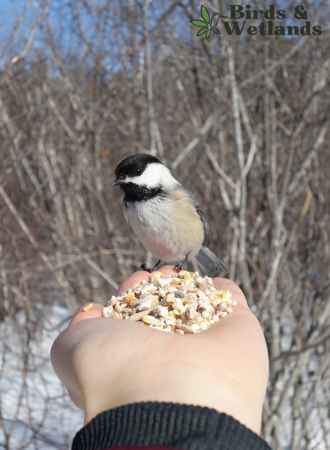
Helping birds in your garden or yard can be a fun and rewarding activity, but it can also have some important benefits for both the birds and your local environment. Here are some of the key advantages of providing food for your many species of birds:
Helps birds survive harsh conditions
Most of the bird populations struggle to find enough food due to habitat loss and during the winter months when insects and other food sources may be scarce. By providing a regular source of high-quality bird feed such as suet cakes and table scraps, you can help birds stay well-fed and healthy even when natural food sources are scarce. Due to readily available foods, garden birds have been showing stable population trends in recent years.
Encourages birds to visit your yard
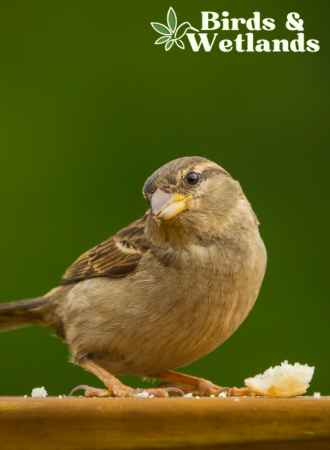
By putting out bird feeders, you can attract birds such as house finches, blue jays, tufted titmouse, great tits, house sparrows and feeder-using species of birds to your yard. This can be especially rewarding if you are a bird enthusiast or simply enjoy watching birds in their natural habitats. Having birds visit your yard can also help create a sense of connection to the natural world and provide a calming atmosphere.
Bird feeding is also popular in other parts of the world. For example, the Australian magpie and other birds frequent feeders.
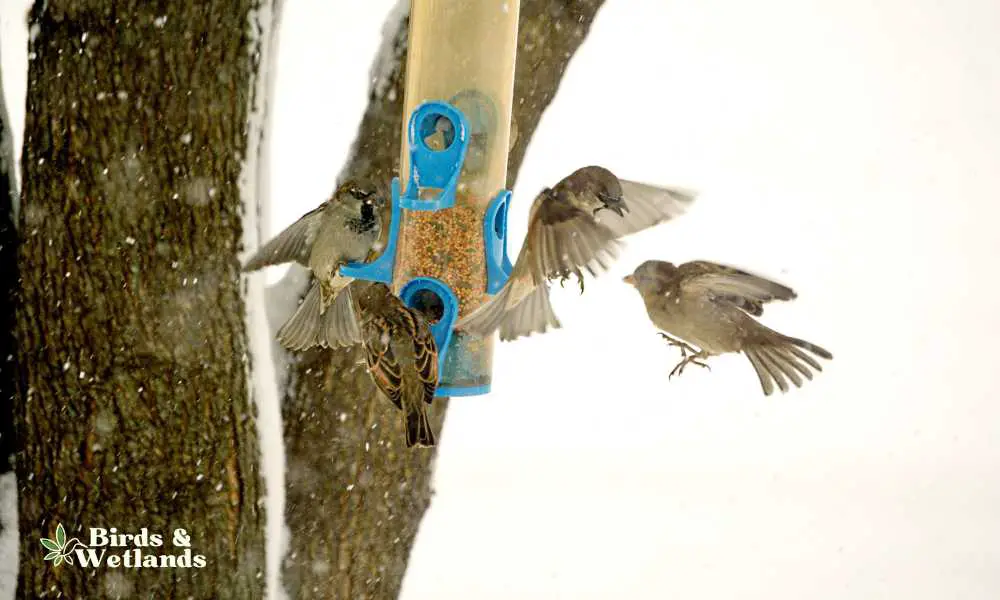
Helps control pests
Many birds feed on insects, including many that are considered garden pests. By providing a habitat for birds in your yard, you can help keep insect populations in check and reduce the need for harmful pesticides.
Supports local biodiversity
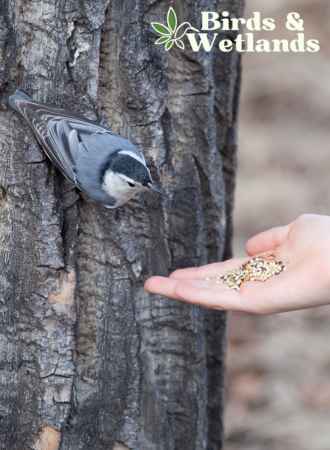
Encouraging a diverse range of garden birds to visit your yard can also support the local ecosystem. By providing food and shelter, you can help maintain a healthy and balanced ecosystem.
Can be a fun and educational activity
Feeding wild birds such as the red-bellied woodpecker and other species in your yard can be a great way to teach children or grandchildren about the natural world and the importance of conservation. It can also be a fun and rewarding activity for people of all ages, and can provide a sense of satisfaction and fulfillment.
How does feeding garden birds help them survive?

Bird feeding can be a beneficial activity for both humans and birds. Providing a regular food source can help birds survive in areas where natural food sources may be limited or difficult to find.
When the winter months arrive, many bird species are forced to deal with colder temperatures and food scarcity. By setting up a backyard bird feeder, you can offer them a reliable source of nourishment to help them survive the harsh winter. During the breeding season, providing extra food for adult birds can help them to produce and care for their offspring.
Bird feeders can attract a wide variety of bird species, each with their own unique dietary needs. Some birds prefer seeds, while others prefer fruit, insects, or suet. By offering a variety of food types, you can attract a greater diversity of birds to your feeder, which can help to support the local ecosystem.
When birds find a reliable food source, they may choose to remain in the area longer, increasing their chances of survival. This can be especially important during migration when birds travel long distances and may need to refuel along the way.
However, it’s important to note that bird feeding should be done responsibly. It’s important to choose the right types of food and feeders and to clean your feeders regularly to prevent the spread of disease.
Why Not to Feed Birds
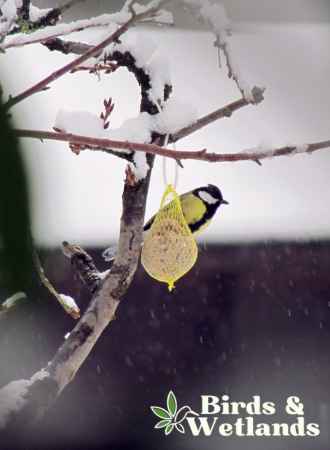
Feeding birds can be enjoyable, whether placing bird feeders in your backyard or throwing breadcrumbs at the park. However, you should be aware of potential drawbacks to feeding birds before starting.
One of the most significant drawbacks of feeding birds is that it can alter their natural behavior. When birds become accustomed to being fed, they may become more reliant on humans for food, making them less self-sufficient in the wild.
Feeding birds can encourage wild animal populations to congregate in larger numbers than they would otherwise, increasing the risk of disease transmission.
Garden feeders can attract unwanted wild animals, especially invasive species. Birds are not the only creatures that enjoy a good meal, and food intended for birds can attract rodents, insects, and other pests to your yard. This can create an unwanted infestation that can be difficult to control. Moreover, garden birds often attract hawks, falcons and other predators.
Feeding birds can also harm their health if the wrong type of food is provided. Many birds have specific dietary requirements that must be met to remain healthy, and feeding them inappropriate foods can lead to malnutrition or even death.
Bread, for example, is a common food that people feed birds, but it lacks the necessary nutrients and can cause digestive problems for most birds.
Another potential issue with feeding birds is that it can lead to overcrowding in certain areas. Birds congregating around feeding stations can create a nuisance for homeowners or others nearby, especially if they leave behind droppings or cause other damage.
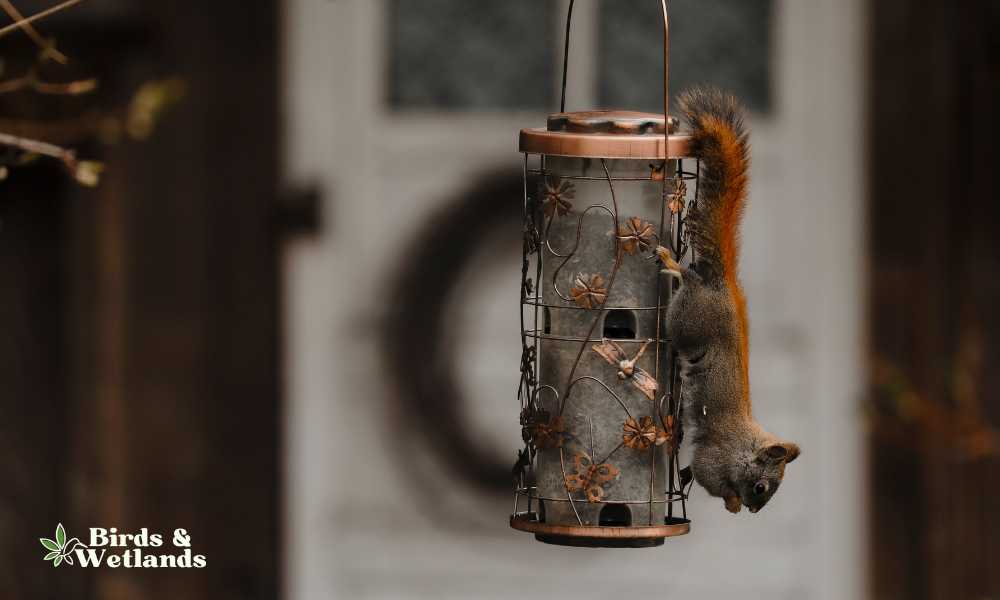
What happens if I stop feeding birds
If you decide to stop feeding birds, several things might happen:
- The Birds Will Adapt: Birds are highly adaptable creatures. If one source of food disappears, they will search out others. While bird feeders can provide a convenient source of food, especially during winter or migration, birds have survived for millennia by foraging for natural food sources.
- Change in Bird Activity: You may see a decrease in bird activity in your yard. If your feeders were popular, there might be a noticeable change as the birds move on to other feeding sites. However, you’ll likely still see birds around, particularly if your yard has native plants, trees, and water sources.
- Less Mess: Without bird feeders, there will likely be less bird droppings in the feeding area, and you won’t have discarded seed shells or uneaten seeds to clean up.
- Less Unwanted Wildlife: Bird feeders often attract other wildlife, like squirrels, rats, or raccoons. Without bird feeders, these creatures will likely visit your yard less frequently.
- Less Chance of Disease Spread: Dense congregations of birds at feeders can facilitate the spread of diseases. By not feeding birds, you may reduce the chance of such outbreaks among your local bird population.
Remember, birds’ reliance on feeders varies greatly by species, location, and time of year. In most cases, if you stop feeding birds, they’ll simply find food elsewhere, but there might be short-term impacts on individual birds, particularly during harsh weather conditions.
It’s best to taper off feeding gradually rather than stopping suddenly, especially in winter. Ultimately, creating a bird-friendly habitat with native plants, which provide natural sources of food and shelter, can be a great way to support your local bird population without needing to provide supplemental feed.
Additional Tips on Bird Feeding
- Choosing the right bird foods such as the bird seed mixes can make a significant difference in the types of birds that visit your backyard. Different birds have unique dietary needs, so selecting appropriate bird food can help attract specific species that you want to see. For instance, if you put out orange wedges, you are likely to attract rose-breasted grosbeak, black-capped chickadee and Baltimore oriole.
- Place your feeders away from windows. Window strikes happen when birds fly to get away from potential predators.
- If you have pets, keep dogs and cats indoors and don’t let them in your own garden where feeders are present.
- Placing feeders all year round can help parent birds exclusively feed their chicks natural foods such as cracked corn.
- Choose feeders that are easy to clean and with no sharp edges.
- Always remove uneaten food from your feeding station.
Related Questions Backyard Bird Supplemental Feeding
Should i stop feeding birds because of avian flu
During an avian flu outbreak, it’s often recommended to stop feeding birds temporarily. Gathering at feeders can increase the risk of disease transmission among birds. However, guidelines can vary, so it’s essential to follow advice from local wildlife or public health authorities. Ensure you regularly clean and disinfect bird feeders and baths even in normal times to help prevent the spread of diseases. After the outbreak has passed, you can resume feeding.

